One year after Kherson’s liberation: a report from the city
The city of Kherson recently celebrated the one-year anniversary of its liberation from Russian forces. While locals remain optimistic about the future of the war, it is clear that the conflict remains a fact of life.
November 24, 2023 -
Joshua Kroeker
-
Photo

The author with local volunteers and members of the military.
On the morning of November 11th 2022, after eight months of Russian occupation, Ukrainian soldiers entered the city of Kherson. Hundreds of locals, who had suffered under Russia’s repressive wartime regime, came out with their previously hidden Ukrainian flags to celebrate the return of their freedom. Yet even one year later, from their positions on the left bank of the Dnipro river, Russia continues to make living in the city nearly unbearable. For the one-year anniversary, I entered the city under constant shelling to speak with the locals, who refuse to give up, as well as the soldiers who continue to defend the city.
The one-year anniversary of the city’s liberation has everyone nervous. Pulling up to the checkpoint a few kilometres before the city gates, soldiers tell us to put on helmets and protective vests. “We are all expecting big provocations,” one soldier explains.
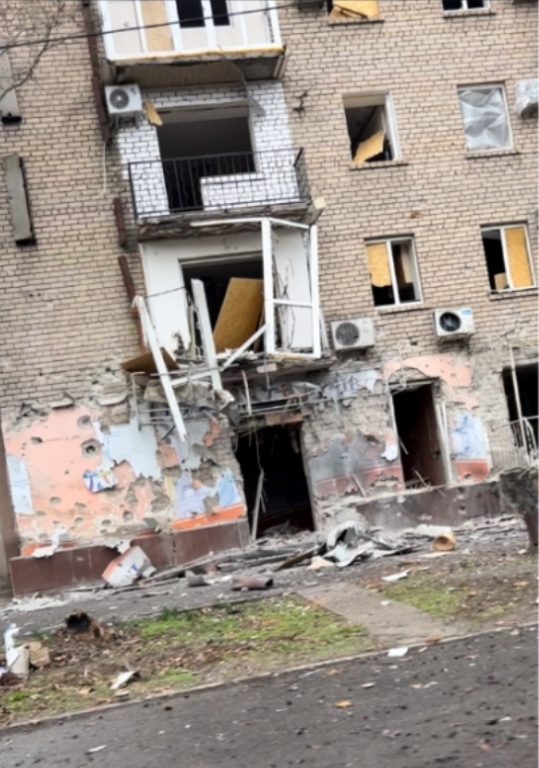
Immediate results of Russian shelling in central Kherson
At the Kherson city sign, we stop the car to put on our gear. I can hear the faint sounds of shelling – it is like the sound of drums being beaten in the distance. The two press officers accompanying us see my worry. One looks to comfort me, explaining that “All is fine. Those are наши (ours).” The noises are caused by outgoing artillery.
We drive about 15 minutes into the city. The omnipresent destruction is not a new sight for me, having just come from the front lines in the Donetsk region. The nearly empty streets cast an ominous feeling over the city. Only a few older pensioners walk down the sidewalks, waiting for the bus or sitting resolutely on a bench. We push on.
Our first stop is near the city park. Together with regional reporters filming a piece on the one-year anniversary, we meet with a local anti-air raid battalion. They demonstrate to us their work, show us their equipment, and explain the threat of Russia’s shelling of the city. The threat, however, is clear. The sound of the shelling grows closer. Now, it is not just “ours”.
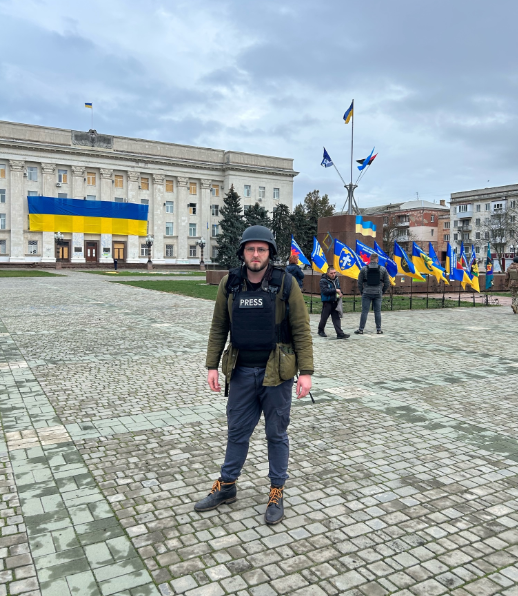
Kherson’s central city square.
While interviewing the commander, the sound of a screaming whistle flies past our heads. I drop to the ground. Seconds later, a deafening explosion follows. The press officer looks at us and says “It looks like they found us. We should move to a new location.” Preparing to depart, an even louder explosion goes off only a few hundred metres from us. I understand immediately that for Kherson, war has never left the city. Neither has the destruction.
We leave the park, moving slowly along the road to the city’s central square. Rubble and shrapnel cover the road. One of the shells we just heard has hit a civilian building, destroying its entire façade. Two elderly residents were injured, which was reported later in the evening. Civilians, press or military, Russia indiscriminately attacks the city. Evidence of war crimes is everywhere.
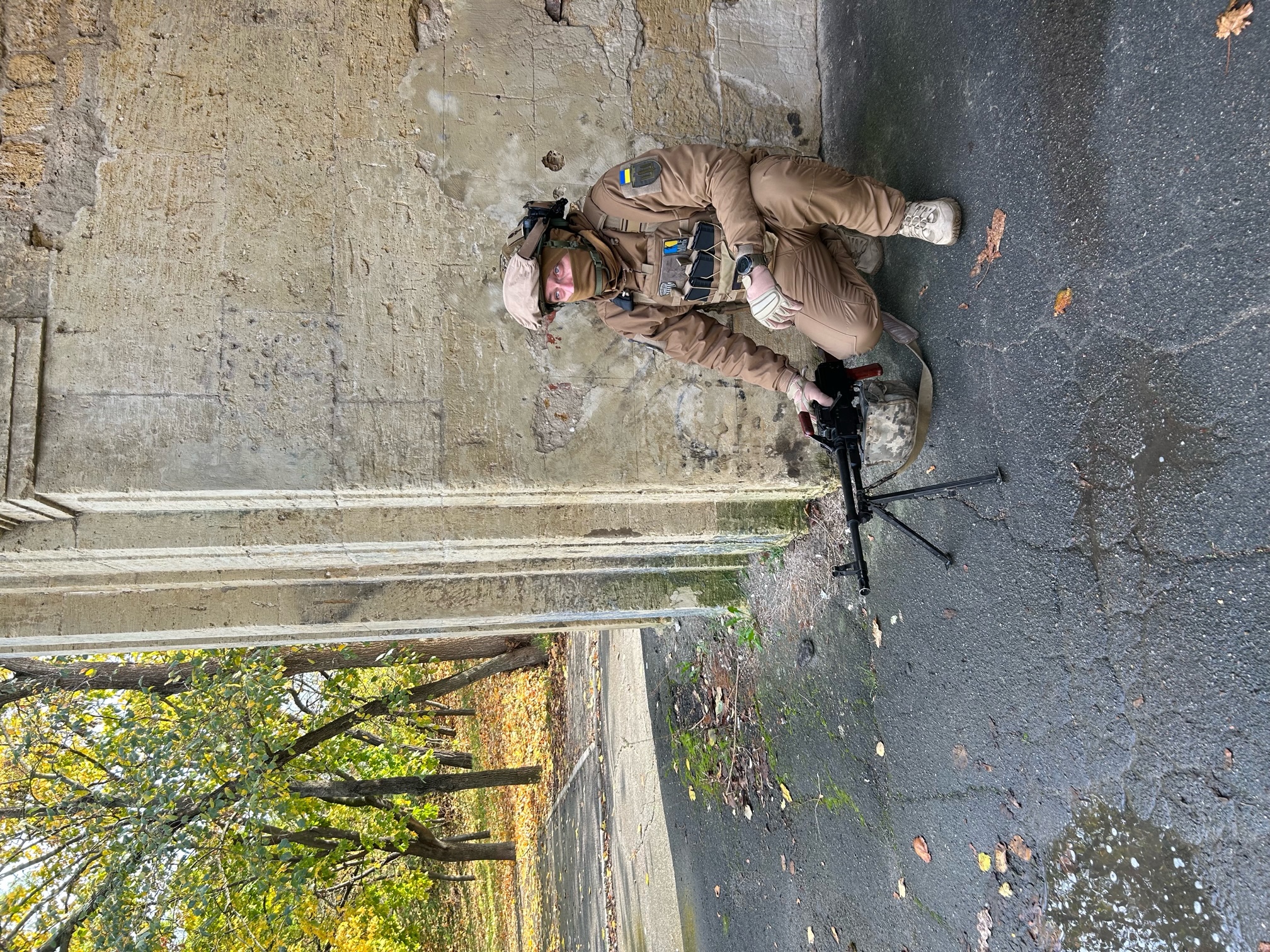
A member of a local brigade defending against Russian shelling.
Paradoxically, the mood in the centre square is jubilant. Couples take photos waving Ukrainian flags, soldiers meet and hug, and journalists film interviews with the background of the city’s administration building. Celebrations of the one-year anniversary of de-occupation outweigh the sounds of incoming and outgoing shelling every 30 seconds or so. One woman, wearing a traditional Ukrainian headdress and carrying a flag with the image of a watermelon – the symbol of the city – dances with a smile from ear to ear. Interviewing one man on the square, I asked him why there is such jubilation. His answer was simple: “We live in Ukraine. We don’t want the “Russian World” here.”
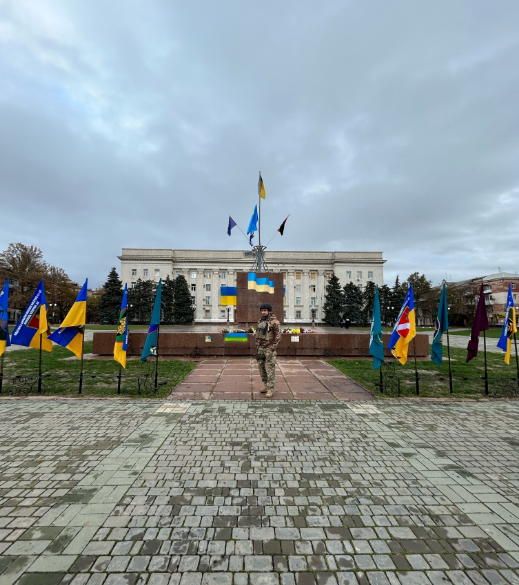
Soldiers taking photographs for the one year anniversary of Kherson’s liberation.
We have a couple more meetings before leaving the city. We need to be quick so as to not stay in any one place for too long, lest Russian drones find our location. The press officers remain on edge – as do I.
We move to the outskirts of the city, further away from Russian positions. Our interlocutors are a local chaplain working with soldiers to overcome depression and psychological stress, as well as a counter-intelligence officer coordinating with locals still under Russian occupation. Both explain the difficulties of defending against Russia but are resolute in their duty to protect Kherson – and Ukraine – from Russia’s relentless invasion. Our meeting is cut short as the press officers explain that the shelling is growing louder and we need to move.
Our last stop, again close to the centre, has us meeting with local drone operators. They explain the effectiveness of their drone attacks and the difficulties of using drones in certain circumstances. They also highlight the need for more: more drones, more weapons, more aid. “With western help”, the 25-year-old commander explains, “we will beat Russia, we will take back Crimea.” His eyes are genuine, as is his confidence. Finally, we meet with a local resident and soldier who was arrested, deported and tortured by the Russians. He recounts his story in terrifying detail, explaining that he will not allow the Russians to do the same to his friends and the country’s children. That is his fight, and despite all his experiences, he has not given up. It is clear that the soldier, the people of Kherson and the people of Ukraine have not given up, despite all the odds and the noticeable decline in western support.
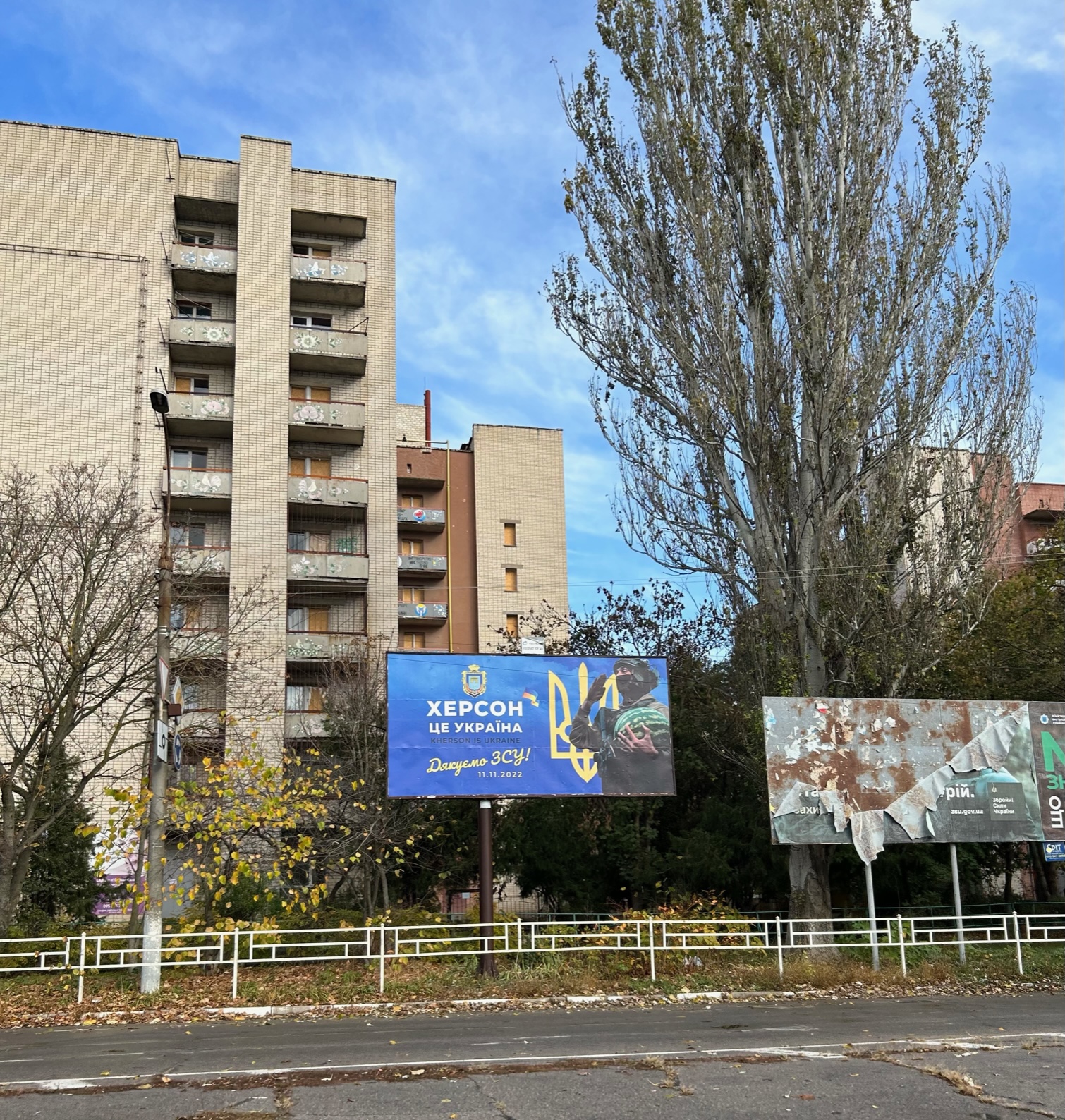
Advertisement for Ukraine’s military in central Kherson.
Leaving the city, passing the Kherson sign once again, and taking off our protective gear, the sounds of artillery can barely be heard. Yet I understand we are leaving Kherson to its fate: its fight for freedom, its goal to live in a peaceful country, to rebuild and heal. Until that day comes, Russia will continue to relentlessly shell the city. People will die but living under occupation is not an option for the residents of Kherson. Kherson is proud. One year of liberation will not be forgotten. They will not surrender.
Later in the night, my contact in the city wrote to me. Russia shelled the main square where we stood only hours before, where one woman danced and celebrated her freedom in Ukraine. It is unclear if there were casualties. But for the people of Kherson, the city still stands. The city, despite all odds, stands in Ukraine. That victory, on the one-year anniversary, belongs to all of the city’s residents and the people of Ukraine.
All photos are from the author’s personal archive.
Joshua R. Kroeker is an independent researcher, founder of the boutique analytic firm Reaktion Group, an analyst at the political analysis project R.Politik, and an editor at RANE. He holds degrees from the University of British Columbia in Canada, Heidelberg University in Germany and St Petersburg State University, Russia. @jrkroeker on Twitter.
Please support New Eastern Europe's crowdfunding campaign. Donate by clicking on the button below.

































